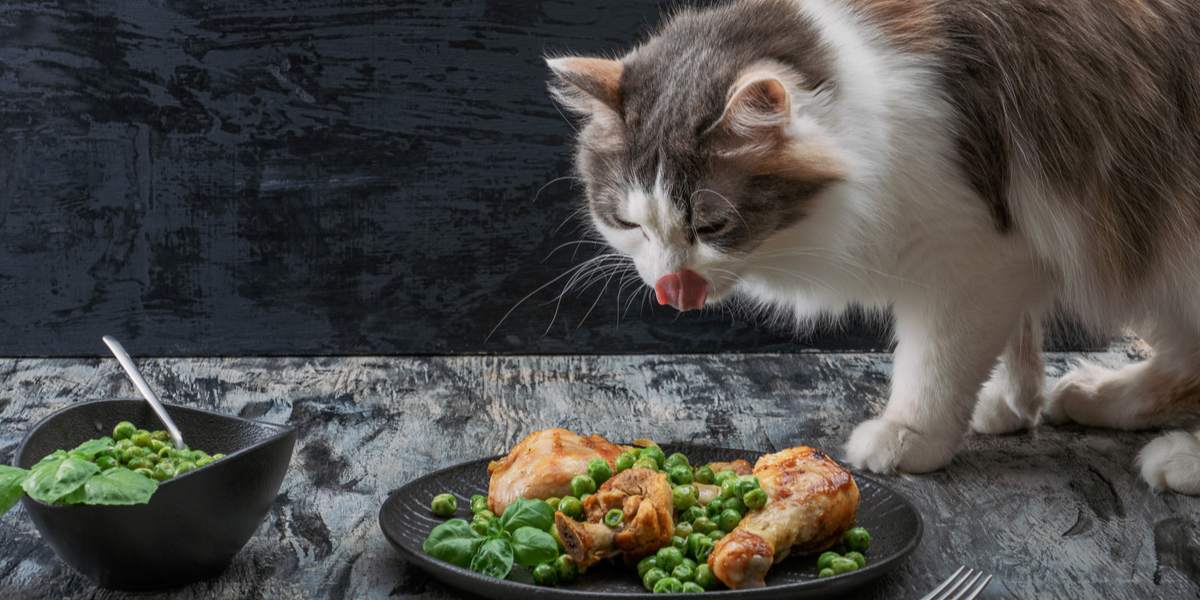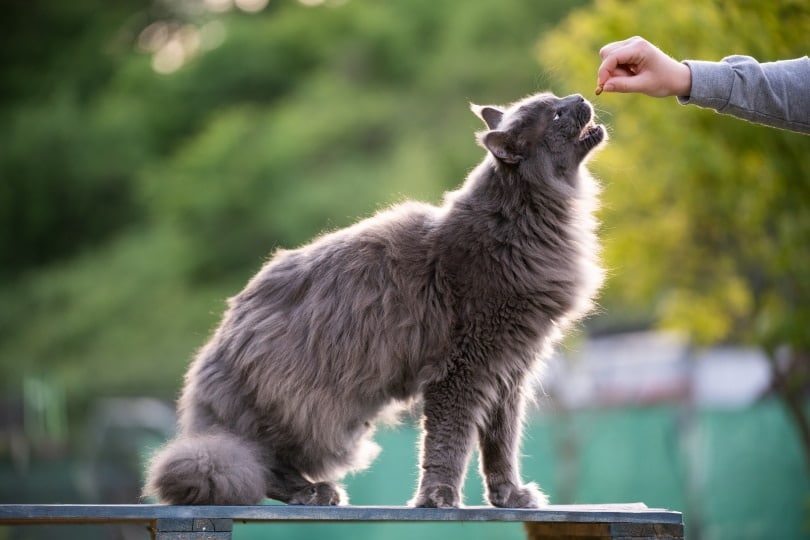As anyone who has ever looked up from a leisurely lunch to see their cat eyeing their food will know that cats are just as good at begging as dogs. But before you give in and share your sandwich, you should check to see if it’s okay. Can cats eat lunch meat?.
In small amounts, deli meat can be a good treat for your cat, but it can’t take the place of a healthy diet. This article will show you how to feed your cat lunch meat and other human foods that are safe for them that they can eat.
Many cat owners have experienced their kitty begging for a taste of their sandwich or eyeing up the sliced turkey in the fridge. Deli meats like turkey often smell enticing to cats. But is deli turkey actually safe and healthy for cats to eat? In this article, we’ll explore whether cats can eat deli turkey, the potential benefits and risks, and how to feed it safely if you choose to offer it as an occasional treat.
Can Cats Eat Turkey from the Deli Counter?
The short answer is yes cats can eat deli turkey in moderation. Turkey is a lean protein-rich meat that cats are well adapted to digesting and gaining nutrients from. Many cats find the smell and taste quite irresistible too!
However. there are a few important caveats about feeding deli turkey to cats
-
It should only be given occasionally, not as a regular part of the diet.
-
Only fresh, high-quality deli turkey should be fed. Avoid anything spoiled, expired or with added preservatives.
-
Deli turkey has a high sodium content, so limit portion sizes.
-
Make sure the turkey is thoroughly cooked, never raw.
So while the turkey itself is fine, some of the additives and sodium content can be problematic. By following the feeding guidelines below, you can safely allow your cat the occasional turkey treat!
Health Benefits of Turkey for Cats
Turkey is a healthy meat option that provides cats with vital nutrients. Here are some of the benefits turkey offers when fed as an infrequent treat:
-
High-quality protein: Turkey is an excellent source of lean, low-fat protein. Protein is essential for maintaining muscle mass and a healthy metabolism in cats.
-
Amino acids: Turkey contains amino acids like taurine that cats cannot synthesize themselves. Taurine is required for heart and eye health in cats.
-
Vitamins and minerals: Turkey provides B vitamins like niacin, vitamin B6 and B12. It also supplies vitamins A, E and K, as well as zinc, iron and potassium.
-
Moisture content: The high moisture content in deli turkey helps contribute to good hydration and urinary tract health.
So in small amounts, turkey can be a beneficial, protein-packed snack for cats. Just be sure not to overfeed it.
Potential Risks of Feeding Deli Turkey to Cats
While deli turkey can make an acceptable occasional treat, there are some potential downsides to be aware of:
-
Sodium content: Turkey from the deli counter often contains very high amounts of added sodium, which can be harmful to cats in excess.
-
Preservatives: Deli meats may include nitrates, nitrites or other preservatives that are unhealthy for cats when consumed regularly.
-
Fat content: Some turkey deli meats like honey turkey can be quite high in fat, which cats have difficulty digesting.
-
Raw meat: Raw deli meats pose a bacteria risk and should never be fed to cats before thoroughly cooking.
-
Weight gain: Since many cats love turkey, it’s easy for them to overindulge, leading to unnecessary calories and weight gain.
As long as you moderate portions and choose high-quality, low-sodium turkey, these risks can be minimized. Never feed your cat expired, rotten or raw deli turkey.
Purchasing Deli Turkey for Cats
When selecting deli turkey to share with your cat, look for varieties that are:
- Low-sodium or no salt added
- Made without nitrates, nitrites or other preservatives
- From the leanest sections of the turkey
- Packaged fresh, not pre-sliced or frozen
Ideally, choose plain roasted or oven-roasted turkey breast. Stay away from heavily processed luncheon meats like honey turkey. And remember – raw is never okay, the deli meat must be fully cooked.
Only purchase amounts you expect your cat to eat within a few days. Keep refrigerated and tightly wrapped to prevent drying out. Don’t feed expired or spoiled turkey.
Serving Size and Frequency Recommendations
For an average 10 lb cat, here are some general turkey feeding guidelines:
-
Feed only 1-2 times per week as an occasional treat
-
Give your cat 1-2 very thin slices or shredded pieces of deli turkey
-
Total weekly portions should not exceed 1 oz
Always monitor your individual cat’s weight, health conditions and calorie needs when determining an appropriate serving. Kittens, seniors and cats with medical issues may require more restricted amounts.
Safe Feeding Practices
Follow these tips for safely feeding deli turkey to your cat:
- Wash your hands before and after handling raw turkey
- Use a dedicated cutting board and knife just for the turkey
- Double check the turkey is fully cooked and not slimy
- Cool to room temp before feeding
- Refrigerate promptly after serving
- Discard any uneaten turkey after 24 hours
Proper food handling hygiene helps kill dangerous bacteria like salmonella that could make your cat sick. Never feed directly from deli packaging, as that introduces contamination risks.
Alternatives to Deli Turkey for Cats
If your cat seems sensitive to turkey or sodium, there are other healthy human foods cats can eat:
- Cooked chicken, beef or fish (no bones)
- Canned fish like tuna or salmon
- Scrambled or hard boiled eggs
- Small amounts of cheese
- Plain cooked rice or pasta
- Steamed vegetables
- Unsweetened yogurt
Just introduce new foods slowly and watch for signs of an upset stomach. Every cat’s tolerance will be a bit different. The key is moderation and variety in treats.
The Bottom Line on Feeding Deli Turkey to Cats
While the majority of your cat’s diet should come from a complete cat food, the occasional scrap of turkey can be safe and healthy. Just be sure to limit portions, choose high-quality deli turkey with no preservatives or added salt, and follow proper food safety practices. Feed as a treat no more than once or twice a week. With these precautions, your cat can safely enjoy this tasty protein source!

Deli Meat and Cats: The Pros and Cons
All meat, including deli meat, is high in protein. Cats are true carnivores, meaning they are adapted to absorb and digest nutrients from animal sources most efficiently. If you want to give your cat treats, you should make sure they are both tasty and good for them. Lunch meat is a good example of this.
However, processed meats aren’t as healthy for anyone—human or cat—as meat in its original form. Many deli types of meat are high in fat and salt and contain artificial flavors, colors, and preservatives. With about 50% of all adult pet cats considered overweight, many owners need to be careful about how many calories their pets consume.

You may know that pregnant women shouldn’t eat deli meat because it could be contaminated with Listeria. This is because of you or someone you know who has been pregnant. Knowing this, you might wonder whether this disease impacts cats as well.
Listeria (L. monocytogenes) is a bacteria that causes food poisoning. It can contaminate many foods, including lunch meat. In humans, Listeria is most dangerous to those with compromised immune systems, like kids, seniors, and pregnant women. Many animals are also susceptible to this bacteria, but cats are only rarely impacted.
Your cat could get sick from Listeria, but the bigger risk is that they could get it without showing any symptoms and then give it to people they live with.
Feeding Deli Meat to Your Cat
When feeding your cat deli meat, choose the leanest, least processed option you can, all-natural if possible. Generally, treats should only make up 10%–15% of your cat’s total daily calories. Check the nutrition label of the deli meat you’re feeding to confirm the calories per slice before giving it to your cat.
Never feed your cat spoiled or expired lunch meat. It can make them sick just like it would a human, including from Listeria.
If your cat is overweight or has a long-term illness, you should ask your vet if deli meat is safe for them to eat. Your vet can also help you figure out how many calories your cat needs every day to stay at a healthy weight. Speak To a Vet Online From the Comfort of Your Couch!.

If you need to speak with a vet but can’t get to one, head over to PangoVet. It’s a cheap online service that lets you talk to a vet and get the advice you need for your pet.
Your cat may enjoy lunch meat as a food garnish for their regular meals or as a snack. Just make sure your cat doesn’t get too used to the deli meat and refuse to eat their normal food. You could also use lunch meat as a training treat or to hide your cat’s pills if it needs them.
Every cat is different, and so is their digestive system. So, while deli meat may be safe to eat, that doesn’t mean it will agree with every kitty. If your cat is vomiting or having diarrhea, you may need to switch up the treats you give them or stop giving them snacks all together.
Can Cats Eat Turkey? (2019)
FAQ
Can cats eat sliced deli turkey?
Is cold turkey okay for cats?
How much turkey is safe for cats?
Can cats eat turkey from Subway?
Can cats eat deli meat?
It can make them sick just like it would a human, including from Listeria. If your cat is overweight or has a chronic health condition, ask your veterinarian if it’s okay for them to eat deli meat. Your vet can also help you determine how many calories your cat should be eating per day to maintain a healthy weight.
Can cats eat deli turkey?
Since turkey is generally okay, people often ask if cats can eat deli turkey, too. No—not unless you see it sliced behind the meat counter from an actual bird. Processed deli turkey is high in unhealthy sodium and nitrates. Any additives, such as smoke flavoring or other seasonings, aren’t good for your feline friend either.
Can cats eat turkey skin?
Yes, cats can eat plain, unseasoned turkey deli meat in moderation. Just be sure to avoid deli meats that are high in sodium or contain any seasonings or additives that could be harmful to your cat. 2.
Can cats eat ground turkey?
However, cats can eat ground turkey when it’s cooked plain. If you want to make an easy homemade cat treat while whipping up some turkey burgers for yourself, simply cook the meat thoroughly, then form kitty-bite-sized patties before you season the meat for yourself.
Can cats eat turkey lunch meat?
It is not recommended to feed your cat raw turkey, as it can contain harmful bacteria such as salmonella. It is best to cook the turkey thoroughly before giving it to your cat. 8.
Can cats eat turkey jerky?
It is best to avoid giving your cat turkey jerky, as it may be high in sodium and additives that could be harmful to your cat. Stick to plain, cooked turkey for your feline friend. 14. Can cats eat turkey burgers?
